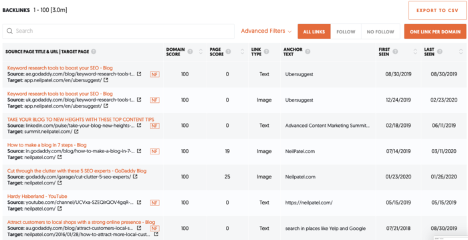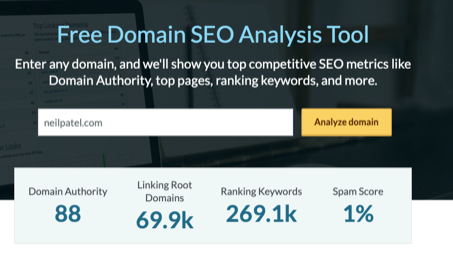
Knowing your domain authority may help you create or improve your marketing plan. But how do you know what your domain authority is?
Let’s dive into what this metric is and some tips for picking the perfect domain authority checker for your business.
What is Domain Authority?
Domain authority (DA) refers to the number of relevant backlinks—links to your website from other reputable sites—your site has. The relevance of those backlinks also contributes to your score.
Moz created the Domain Authority metric to help businesses figure out where they may rank on search engine results pages (SERPs). They estimate a page’s possible ranking via several channels, “including linking root domains and the number of total links, into a single DA score. This score can compare websites or track the ‘ranking strength’ of a website over time.”
Some brands are authoritative without even seeming to try. This is because the keywords that naturally exist on their websites will carry some weight.
For example, movie site IMDB has a high DA because relevant keywords are naturally integrated throughout the site. Secondary related keywords are also prevalent.
When you have a better idea about the terms for which you’re deemed authoritative, you’re able to optimize your site better.
But it’s not just keywords—the better your backlinks are, the better your chances are at increasing in DA.
Domain authority is determined on a logarithmic scale. This means solo metrics won’t always increase or decrease the score to the same degree. The more important a metric is, the greater effect it’s likely to have.
Why Should I Care About Domain Authority?
Although Google doesn’t use domain authority in their rankings, but a study by Ahrefs found a correlation between DA and SERP ranking.
The results of this study suggest DA may be a useful metric by which to gauge how much organic traffic you may receive from Google.
If you want to grow your SEO rankings, consider ramping up your domain authority strategy. However, it can take a while to develop authority, so don’t worry if you don’t see results right away.
What is a Good Domain Authority Score?
Domain authority scores range from one to 100. When you have a greater domain authority score, it’s more likely you’ll see increases in web traffic and SERP rankings.
When you debut a new website, its domain authority is one. Moz points outsites with many external links are usually higher when it comes to DA, while small business sites and those with fewer inbound links generally have a lower DA score.
A strong gauge for your site is to measure it against other comparable or similar sites. Your DA can fluctuate over time and, with so many moving parts, identifying why it changed can be challenging. But don’t give up.
Moz highlights several factors that can influence your score.
One could simply be that your link profile growth hasn’t been seen by their index yet.
Another occurs when higher-authority sites experience massive growth in link numbers, which may skew the scaling process. This kind of fluctuation may more significantly impact domain authorities on the lower end.
You may also have earned links from sites that don’t contribute to ranking on Google. If Moz crawls a different amount of link domains than it did last time it went through your site, results may be affected.
How Can You Raise Your Domain Authority Score?
Raising your DA is a long-term process, but there are several ways to go about it.
First, conduct a link audit. This process involves making sure that links to your website are valid and don’t include black-hat SEO tactics. TryUbersuggest to get insight into your domain score, the current number of backlinks, and referring domains.
Backlinks, which are links from other websites to yours, affect SEO rankings—thoughbacklinks aren’t all created equal.
Do you know how to go about getting high-quality links? Try ourfree backlink tool, Backlinks, to get started. Among other things, it’ll show you which sites are linking to your competitors rather than to you.

Various filters make it easy to assess which opportunities are best suited to your needs.
It’s also beneficial to search for local directories or “best-of” lists that could feature your business. These sites are often adding new businesses.
How Do You Check Your Domain Authority?
There are several link authority tools out there. How do you know which one is right for you?
SEO Review Tools has a basic domain authority checker. It looks at authority (based on backlink quantity and quality) and content.
Other metrics measured by this tool include website age and social media score. Your social media score relates to how active your social profiles are and how many shares your content receives.
Page authority is also measured. This metric is like DA, except it looks at a specific page rather than entire sites. Page authority is also calculated on a one to 100 logarithmic scale.
If you want to check several sites at once,Linkgraph’s Free Bulk DA Checker may be the perfect option. This tool allows you to check DA and spam metrics for up to 10 URLs at a time.
If you want to check even more domains, Rankz’s SEO Rank Tracker lets you check hundreds at once. They also offer a backlinks checker, backlinks monitor, and domain availability checker.
Moz has a comprehensive free domain SEO analysis tool. It showcases top pages by links, discovered and lost links, top linking domains, and keywords by estimated clicks. Of course, you can also find some of this information using Ubersuggest as well.
For example, when you search for the DA of neilpatel.com on Moz, it’s revealed it is 88, and there are 69,900 linking domains (i.e., backlinks). There are also over 269,000 keywords for which the site ranks, and the spam score just 1%.

The tool then breaks down the site’s most important pages based on page authority and other top-linking domains. You can also find metrics like top-ranking keywords, keywords by estimated clicks, top featured snippets, branded keywords, and more.
You can also see a breakdown of competitors using your keywords. You can then take the competing domains and plug them into a bulk checker like the ones noted above.
How Do You Integrate Your Domain Authority into Your SEO Strategy?
Once you’ve determined your domain authority score and the factors influencing it, what should you do next?
Start with backlinks. You want to give other sites a reason to link to yours.
If you specialize in something unique or offer a new option for a product or service, that could be a great start. Work to provide better information on your niche than your competitors do.
It may also be wise to collaborate with small businesses with whom you could forge mutually beneficial partnerships.
Reach out to companies with whom you already have relationships, too. See if there are ways you can support each other’s online presence. Swapping testimonials is just one of the many tactics you could employ.
You should also explore your existing content for opportunities to add links. For example, if you mention a coffee shop, link to their website. If they’re monitoring their web traffic, they’ll see you linked to them and may feel inclined to return the favor.
Of course, you want to make sure all the backlinks you receive are of high quality.It’s better to have a few quality backlinks than a ton of ineffective ones.
Guest posting on other sites may also help get your name and site out there. However, some sites are better suited for this than others.
When assessing which blogs to guest for, check if their links are “follow” or “nofollow.” This may impact how much value the link has, though all links will help users get to your website, so also think of links as a branding and referral traffic tool as well.
You should also look at their DA and PA for target pages, how long their posts are, and who their audience is. If their goals aren’t similar to yours, guest posting may not be worth the time.
This aspect of growing your domain authority overlaps with your content marketing strategy. Most companies now have blogs or similar outlets on their websites—so, if you don’t, consider starting something like this.
The more content you create regularly, the more likely you are to rank.
Conclusion
Domain authority may seem complicated at first. Many factors contribute to your ranking, and analyzing them all may seem daunting.
Nevertheless, once you get the hang of DA, it’s worth monitoring and optimizing for it.
Adding this to your SEO toolbox may allow you to have a more comprehensive understanding of your overall digital presence and website health.
Have you had success in improving your domain authority? Tell us in the comments.
The post How to Boost Domain Authority: Checking and Improving This Key Site Metric appeared first on Neil Patel.
from Blog – Neil Patel https://ift.tt/2orjoHS
via IFTTT
